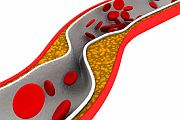Reductions in myocardial infarction, repeat revascularization for DES versus bare metal stents
TUESDAY, April 21, 2015 (HealthDay News) — For older patients undergoing percutaneous coronary intervention (PCI), drug-eluting stents (DES) offer clinical benefit over bare metal stents (BMS), according to a study published in the May 1 issue of The American Journal of Cardiology.
Fabio Mangiacapra, M.D., Ph.D., from the Bio-Medico University of Rome, and colleagues examined the long-term efficacy and safety of DES in 635 consecutive elderly patients (≥75 years) who underwent PCI. One hundred seventy patients received at least one DES and 465 received BMS only. The researchers compared the incidence of net adverse clinical events (NACE) at a median follow-up of 31.2 months. Follow-up data were available for 593 patients.
The researchers found that at five years, the Kaplan-Meier estimate of NACE was significantly lower in the DES versus the BMS group (40.5 versus 55.7 percent). Benefit in the DES group was driven by significant reduction in myocardial infarction (8.6 versus 16.6 percent) and target vessel revascularization rates (7.9 versus 21.9 percent); there was no significant increase in the incidence of bleeding events (13.8 versus 12.2 percent; P = 0.882). Propensity score-adjusted Cox proportional hazard analysis confirmed these results.
“This net clinical benefit, resulting from persistent efficacy and safety over time, may support the use of DES as a reasonable option in patients ≥75 years,” the authors write.
Copyright © 2015 HealthDay. All rights reserved.








